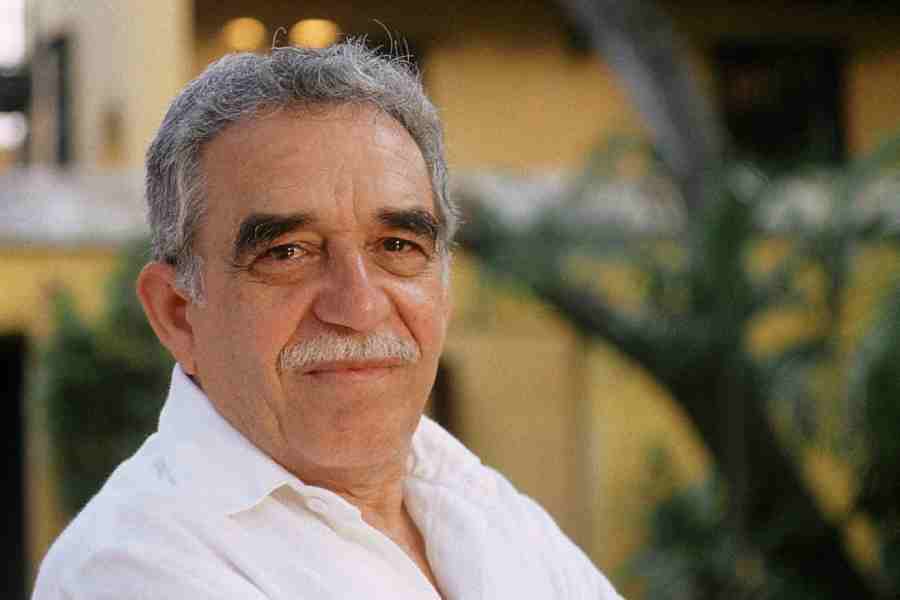Towards the end of his life, when his memory was in pieces, Gabriel García Márquez struggled to finish a novel about the secret sex life of a married middle-aged woman.
He attempted at least five versions and tinkered with the text for years, slashing sentences, scribbling in the margins, changing adjectives, dictating notes to his assistant. Eventually, he gave up and issued a final, devastating judgement.
“He told me directly that the novel had to be destroyed,” said Gonzalo García Barcha, the author’s younger son.
When García Márquez died in 2014, multiple drafts, notes and chapter fragments of the novel were stashed away in his archives at the Harry Ransom Centre at the University of Texas at Austin. The story remained there, spread over 769 pages, largely unread and forgotten — until García Márquez’s sons decided to defy their father’s wishes.
Now, a decade after his death, his last novel, titled Until August, will be published this month, with a global release in nearly 30 countries. The narrative centres on a woman named Ana Magdalena Bach, who travels to a Caribbean island every August to visit her mother’s grave. On these sombre pilgrimages, briefly liberated from her husband and family, she finds a new lover each time.
The novel adds an unexpected coda to the life and work of García Márquez, a literary giant and Nobel laureate, and will likely stir questions about how literary estates and publishers should navigate posthumous releases that contradict a writer’s directives.
For García Márquez’s sons, the question of what to do with Until August was complicated by their father’s conflicting assessments. For a while, he worked intensely on the manuscript, and at one point sent a draft to his literary agent. It was only when he was suffering severe memory loss from dementia that he decided it wasn’t good enough.
By 2012, he could no longer recognise even close friends and family — among the few exceptions was his wife, Mercedes Barcha, his sons said. He struggled to carry on a conversation. He would occasionally pick up one of his books and read it, not recognising the prose as his own.
García Márquez confessed to his family that he felt unmoored as an artist without his memory, which was his greatest source material. Without memory, “there’s nothing”, he told them. In that fractured state, he began to doubt the quality of his novel.
“Gabo lost the ability to judge the book,” Rodrigo García, the eldest of his two sons, said. “He was no longer able to even follow the plot, probably.”
Reading it again years after his death, his sons felt García Márquez may have judged himself too harshly. “It was much better than we remembered,” García said.
His sons acknowledge that Until August doesn’t rank among García Márquez’s masterpieces, and fear that some might dismiss the publication as a cynical effort to make more money off their father’s legacy. “We were worried of course to be seen as simply greedy,” García said.
Unlike his sprawling, lush works of magical realism — epics like Love in the Time of Cholera and One Hundred Years of Solitude, which has sold some 50 million copies — Until August is modest in scope. The English language edition, which comes out on March 12 and was translated by Anne McLean, unfolds over just 107 pages.
The brothers argue that it’s a valuable addition to García Márquez’s body of work, in part because it reveals a new side of him. For the first time, he centred a narrative on a female protagonist, telling an intimate story about a woman in her late 40s who, after nearly 30 years of marriage, begins seeking freedom and self-fulfilment through illicit love affairs.
They also tried to change the text as little as possible and decided not to patch up the prose or add any phrases that didn’t come directly from García Márquez’s drafts or notes.
Still, some readers and critics may question their choice to release a work that García Márquez himself considered incomplete, potentially adding a disappointing footnote to a towering legacy.
The author left various notes on the manuscript of Until August. In his native Colombia, where García Márquez’s face appears on the currency and anticipation for the book is high, many in literary circles are eager for anything new by García Márquez, however unpolished. Still, some are wary of the way the novel is being sold.
The Colombian novelist Héctor Abad said he was sceptical about the publication at first, but changed his mind when he read an advance copy.
“I was afraid it might be an act of commercial opportunism, and no, it is quite the opposite,” Abad, who will appear at an event celebrating the novel in Barcelona, said in an email. “All the virtues that made the best García Márquez great are also present here.”
There’s no doubt that García Márquez at one point felt the novel was worth publishing. In 1999, he read passages during a public appearance with the novelist José Saramago in Madrid. Excerpts from the story were later published in Spain’s leading newspaper, El País, and in The New Yorker. He set the project aside to finish his memoir and published another novel, Memories of My Melancholy Whores, which got mixed reviews.
He began working on it intensely again in 2003, and a year later, he sent the manuscript to his agent, the late Carmen Balcells.
In the summer of 2010, Balcells called Cristóbal Pera, an editor who had worked with García Márquez on his memoir. She said that García Márquez, who was then in his 80s, was trying to finish a novel, and asked Pera to help him. García Márquez was highly guarded about his works in progress, but a few months later, he allowed Pera to read a few chapters of the novel, and seemed excited about it, Pera recalled. About a year later, his memory faltering, the author struggled to make sense of the narrative but continued to scribble notes in the margins of the manuscript.
“It was therapeutic for him, because he was able still to do something with a pen and paper,” Pera said. “But he was not going to finish.”
“When I read those three or four chapters with him together, the first thing I thought was, I would love all his readers to enjoy this amazing story,” said Cristóbal Pera, the editor who worked on the manuscript. When Pera gently urged García Márquez to publish the book, the author was firmly against it. “He said, at this point in my life, I don’t need to publish anything else,” Pera recalled.
After his death at age 87, various versions of Until August were kept at the Ransom Center archives.
Two years ago, García Márquez’s sons decided to take a fresh look at the text. The novel was messy in places, with some contradictions and repetition, they said, but it felt complete, if unpolished. It had flashes of his lyricism, like a scene where Ana, about to confess her infidelity to her mother’s grave, tightens her heart “into a fist”.
Once the brothers decided to publish the novel, they faced a puzzle. García Márquez had left at least five versions in various stages of completion. But he provided a clue about which one he preferred.
“One of the folders that he kept had a ‘Gran OK final’ on the front of it,” García Barcha said.
“That’s before he decided it was not OK at all,” his brother added.
In constructing the most coherent version they could, Pera and the brothers established a rule:
They wouldn’t add a single word that wasn’t from García Márquez’s notes or different versions, they said.
As for the fate of any other unpublished works by García Márquez, his sons say it’s not an issue: There’s nothing else.
Throughout his life, García Márquez routinely destroyed older versions of published books and unfinished manuscripts because he didn’t want them to be scrutinised later.
That was among the reasons they decided to publish Until August, they said.
“When this book is released, we’ll have all of Gabo’s work published,” García Barcha said. “There is nothing else in the drawer.”
New York Times News Service










